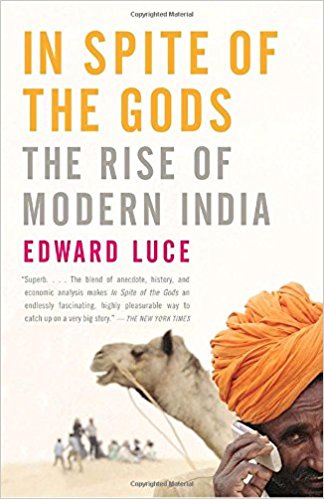In Spite of the Gods Summary
4 min read ⌚
 The Rise of Modern India
The Rise of Modern India
To begin with, the transformation is perhaps the most challenging part.
Witnessing comes secondary.
Who Should Read “In Spite of the Gods”? And Why?
Its spiritual path is probably the most significant indicator of India’s culture and technological development. However, even religiousness comes at a price.
“In Spite of the Gods” is not just a history material that may or may not be amusing to some. It is a first-class comprehensive, fact-filled book that explains India’s difficulties from the beginning of the 20th century.
As such, it is highly recommendable to all people, motivated enough to learn a little more about the Indian culture, history, and way of life.
About Edward Luce
 Edward Luce was born on June 1st, 1968 in Sussex – England. He is an author, columnist, journalist and the chief of The Financial Times located in Washington D.C and South Asia based in New Delhi.
Edward Luce was born on June 1st, 1968 in Sussex – England. He is an author, columnist, journalist and the chief of The Financial Times located in Washington D.C and South Asia based in New Delhi.
During Clinton’s mandate, Edward worked as a speechwriter, with a team of experts.
“In Spite of the Gods Summary”
For hundreds of years, India has been the most prominent representative of spirituality. Its spiritual destiny gave birth to numerous saints, religious people, and religions. In essence, no one can deny the significant impact that this country had (and still has) over the world, especially Westerners.
The cultures differ, but the bridge of connection carries the same burden. The powerful pull and notion of India remain a mystery even now.
“In Spite of the Gods” is s book that answers and resolves many stereotypes linked to India, back and forward. Not even Winston Churchill’s claim that – India is a beastly country with a beastly religion” managed to ruin the reputation of the Indian people.
Nevertheless, spirituality according to experts contributed a lot to India’s poverty and lack of economic opportunities.
The reformer Mahatma Gandhi used only love to transform the rural parts of India and to spark progress. The village life and poverty were taken as a starting point for the building-block to appear.
These urban centers and industries were a turning point for the Indian people because it helped millions to improve their standard of living. This is a process, which lasts to this day, and obstructions are unavoidable.
Mahatma didn’t oppose the challenges linked to the new reforms; he embraced them with utmost sincerity. The desire to improve lives was a motivation to reshape the Indian culture.
The improvements are visible and even tangible because “rural” India, has become an economic and military power in the digital age. More and more Indians are prone to learn the Western way of life and implement some of the things in their culture.
However, the Gandhi’s ideology and social ideas encountered resistance in those days. According to young entrepreneurs, his methods are primitive and useless. Bhimrao Ambedkar, for example – the leader and creator of the untouchable Dalit caste, actively confronted the term and ideology known as Gandhianism.
According to him, the village communities and social establishment will continue to keep India on the verge of economic collapse. He despised the shallow perspective and firmly believed in democracy as a tool for fighting the oppressive caste system.
Unfortunately, the assassination of Gandhi brought India back to the early beginnings. Jawaharlal Nehru – India’s first prime minister, re-organized the country by enforcing some socialist-oriented perspective and ideology.
The growth of democracy was put on hold, at least for some time. The secular, socialist path was in one way or another a new start for India. The Nehru’s politics and socialism included the creation of Non-Aligned Movement in association with other North African nations and Yugoslavia.
The capital-intensive industries in allegiance with a socialist policy did very little to solve India’s massive unemployment situation. The poorness, derived from all sides, and this was a case of one-sided interest that protected the entrenched industrial interest.
For this reason, the government enforced some educational programs, conveying the same message, leading to far greater poverty. As shown above, India was trapped in illiteracy and a shortage of top-quality universities available to everyone. This remained a privilege for the upper class.
Dozens of similar books share the same passion but not the same information and ingenuity. Although, India currently doesn’t have the largest population, inevitably experiences class division and underdevelopment.
“Chindia,” is a term used for conducting comparison among the world’s most populous nations. Edward Luce makes it very clear that comparing countries is a perfect way of assessing the analytical, economic, and intellectual capacity of some country.
Key Lessons from “In Spite of the Gods”
1. India’s cultural richness has no beginnings nor endings
2. The power of diplomacy
3. Indian Muslims remained in India
India’s cultural richness has no beginnings nor endings
Thousands of perspectives have sprouted and collapsed over some time.
This so-called country of wisdom and spiritual movement endured for a long time to keep its secrecy and cultural richness. People are accustomed to changing!
The power of diplomacy
The United States decided to use India, as a counterpart to defy the Chinese growth and military potential.
In short, the U.S without hesitation accepted India’s nuclear status, as a result of China’s economic and military arsenal.
Indian Muslims remained in India
Even though many questioned their loyalty to India, Muslims from India without doubt, decided to live and fight for their country during and after the Indo-Pakistani conflict.
According to them, there is nothing wrong with being faithful to your country and religion.
Like this summary? We’d Like to invite you to download our free 12 min app, for more amazing summaries and audiobooks.
“In Spite of the Gods” Quotes
If Gandhi had not been cremated, he would be turning in his grave. Click To Tweet Somebody once described wars between India and Pakistan as ‘communal riots with armor’ (‘communal’ meaning religious). Click To Tweet India will overtake Japan sometime in the 2020s to become the third largest economy in the world. Click To Tweet India’s failings have nothing to do with a lack of resources. Poorer countries, such as Bangladesh and Botswana, have better human development indicators than India. Click To Tweet Between 1947 and 1989, India had six prime ministers. Between 1989 and 2004, it had seven. Click To TweetOur Critical Review
We, recognized the value, originating from this one-of-a-kind piece of writing. This excellent, well-written book is much more than a reportage on India.
Edward Luce, take matters on to the next stage, by providing a colorful, eye-catching picture of the country with a traditional background.
Emir is the Head of Marketing at 12min. In his spare time, he loves to meditate and play soccer.


 The Rise of Modern India
The Rise of Modern India




